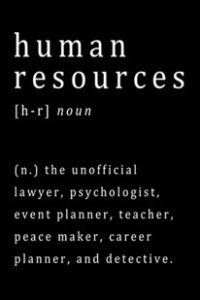Building a Successful HR Department in the Construction Industry
All too often, executives hiring for their companies or departments have blamed, shamed, or remained steadfast that their in-house Human Resources employee was why they lost a candidate to another company.
To their misnomer, Human Resources supports leadership and hiring managers. When properly trained and doing their roles successfully, they help to implement and manage procedures and systems, including the hiring and onboarding process, that increase the effectiveness and efficiency of the company. In addition, successful Human Resources professionals help personnel understand their roles and the job’s expectations, which benefits the company and job satisfaction overall.
The misnomer is they are the decision-makers when it comes to hiring, and they control the timing of the hire. Unless they are the CEO, president, or lead executive within the company, with the responsibilities under that title being a dual role in Human Resources, they can be asked to aid in the hiring decision. Yet the title does not empower them to decide who to hire, the timing of the hire, or what to pay them just by the title within the human resource category.
The Problem with a One-Size-Fits-All Approach to HR
The breakdown with Human Resources comes when leaders take a one-size-fits-all approach similar to what we often see with Construction Management. They expect one person to take on all the responsibilities and be good at everything to do with the responsibilities of the title. This ultimately fails with time because every human being has their strengths and weaknesses.
If a construction company hires a construction manager to be the sole estimator, project manager, and superintendent for the company, a large single project, or multiple smaller projects simultaneously, the construction manager may be able to do the job, yet they will be more effective in the areas they are best trained and proficient in by nature. They could be great at planning and administering the project, yet the jobsite itself lacks organization and clear direction for the subcontractors.
According to the Society of Human Resources Management (SHRM),
Human resource management (HRM or HR) is the strategic and coherent approach to the effective and efficient management of people in a company or organization such that they help their business gain a . It is designed to maximize employee performance in service of an employer’s strategic objectives. Human resource management is primarily concerned with the management of people within organizations, focusing on policies and systems. HR departments are responsible for overseeing employee-benefits design, employee recruitment, training and development, performance appraisal, and reward management, such as managing pay and employee benefits systems. HR also concerns itself with organizational change and industrial relations, or the balancing of organizational practices with requirements arising from collective bargaining and governmental laws.
The overall purpose of human resources (HR) is to ensure that the organization is able to achieve success through people. HR professionals manage the human capital of an organization and focus on implementing policies and processes. They can specialize in finding, recruiting, selecting, training, and developing employees, as well as maintaining employee relations or benefits. Training and development professionals ensure that employees are trained and have continuous development. This is done through training programs, performance evaluations, and reward programs. Employee relations deal with the concerns of employees when policies are broken, such as cases involving harassment or discrimination. Managing employee benefits includes developing compensation structures, parental leave programs, discounts, and other benefits for employees. On the other side of the field are HR generalists or business partners.
The key to the above is that there is the function of Human Resources and then there are the various jobs within the areas of Human Resources under a myriad of titles. Some titles might be HR Manager, HR Director, HR Administrator, Employees Relations Manager, and the newest trending in Corporate America—Chief People Officer.
The Role of HR in Construction Companies
Indeed has an article on their site called “Top 11 Careers in HR.” The most common responsibilities that must be covered within construction businesses are the processes to meet compliance for hiring and firing and maintaining state and federal labor laws, along with international if working abroad, payroll, and benefits. Smaller construction companies often do not have a dedicated Human Resources role, and these responsibilities are part of one of the accounting and administration roles, and quite often, that might be the controller or office manager. Remember, titles are just that—titles—and each company defines responsibilities for the titles they assign.
The Importance of HR Support in Recruitment
What about Human Resources and recruitment? Unless a company has a dedicated in-house recruitment professional or team of professionals, the main responsibility of Human Resource’s job is to actively source and recruit for the company. They are a support in the process and not a deterrent. If you have a dedicated recruitment specialist on your team, making sure they are fully trained on not only your hiring processes but also your hiring preferences will be the key to their success and yours. This includes, with both scenarios, the relationship and boundaries they have with their outside resource firms for staffing, payroll, and benefits.
Strategies for Successful HR and Leadership Collaboration in Construction
What questions can you ask to help your in-house professionals succeed in the hiring process?
- Do they know how to identify if someone is qualified for each specific role you will be hiring?
- Do they know enough about the leaders within the organization and their preferences?
- Do they know how to identify behavioral characteristics that might not fit within your company culture?
- How are they paid and incentivized? Is it for strictly signing them on or also helping the new hire succeed?
- Do they sell individuals on joining your company instead of verifying that the individual is a right match at the right time and can achieve both the candidate and company’s objectives with time?
HR Challenges in Construction Management
Most Human Resources professionals have post-secondary education in Human Resource Management (general), Business Administration, General Management, or Organizational Leadership. Additional certifications are available through the Society for Human Resource Management (SHRM) and the HR Certification Institute (HRCI).
Many people choose a career in Human Resources because they like to help people yet find that the job is extremely process-and-procedure focused, and one size does not fit all. This can take the enjoyment out of helping people. Those who go into the recruitment side of the department typically have better communication skills yet may not be naturally gifted nor interested in the organizational, compliance, and administrative responsibilities that fall within Human Resources.
When executives expect one person to be great at all the responsibilities that fall within Human Resources, they set that person up for failure. Combine unrealistic expectations with little or no communication and direction from their boss and the C-suite executives, and it is a recipe for disaster. This can be due to a lack of knowledge, personal financial gain, attention, or control. All are by-products of misunderstanding and a lack of boundaries and accountability from leadership.
We embrace working with Human Resources professionals who provide structure, service, and support to the person directly responsible for hiring and managing the new employee. Some of the best we work with provide help to not only attract the right candidate but also help them onboard for success.
To Help with the Hunt
- Job outlines or descriptions and other information to aid in the search
- Compensation ranges and historical pay and bonus amounts
- Benefit outlines and cost
To Help with the Catch
- Timely produced and professionally outlined offer letters
To Help with the Keep
- Welcome starting within 24 hours of signed acceptance
- Regularly touching base before their start date
- Clearly outlined and managed onboarding and training processes
Human Resources is more than a title, yet it is not, all in all, for everything to do with people. A meme on the internet says:

If you notice, it doesn’t say owner, executive, general manager, or employee advocate. Human Resources done right is the best neutral helpmate and guidance in structure to cheerlead your success and the overall success of the company.
Are you giving Human Resources the support they need for their career success? It starts with understanding what the title covers and the capabilities of the person granted it.
To Your HR Success!
Suzanne Breistol




